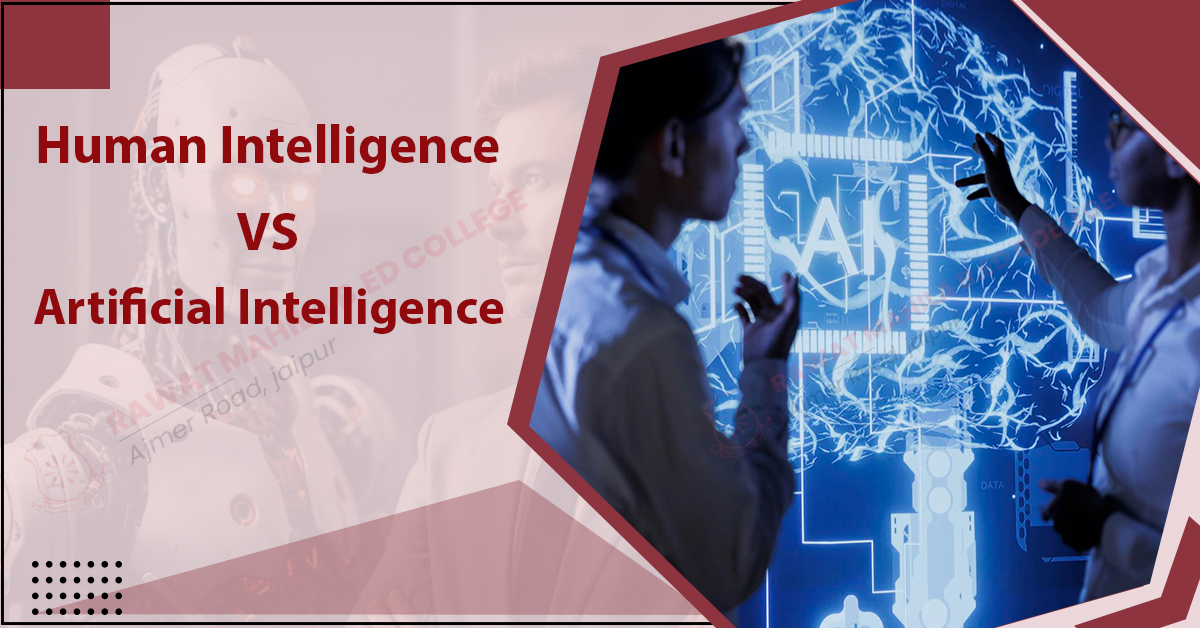Human Intelligence vs Artificial Intelligence

What is Human Intelligence?
Human intelligence refers to the capacity and ability of individuals to acquire, process, comprehend, apply knowledge, and adapt to new situations effectively. It involves the integration of various cognitive functions such as reasoning, problem-solving, learning, memory, and the ability to understand complex concepts, as well as the capacity for emotional and social understanding.
Human intelligence is multifaceted and encompasses a broad range of mental capabilities that enable individuals to navigate and interact with their environment in a meaningful and adaptive manner.
What is artificial intelligence?
Artificial Intelligence (AI) refers to the development of computer systems that can perform tasks that typically require human intelligence. Learning, thinking, solving problems, perceiving, comprehending language, and making decisions are some of these tasks.
AI aims to create machines or software that can simulate and replicate human-like cognitive functions, enabling them to adapt, improve, and perform tasks autonomously.
Difference Between Human intelligence and Artificial intelligence
Human intelligence and artificial intelligence are distinct in their nature, origin, and capabilities. Here's a comprehensive exploration of the differences between the two, encapsulated within a thousand words.
- Origins and Nature:
Human Intelligence: Human intelligence is a result of the intricate and dynamic functioning of the human brain. It involves a complex interplay among neurons, neurotransmitters, and various brain regions, giving rise to consciousness, self-awareness, emotions, and diverse cognitive abilities.
Artificial Intelligence: Artificial intelligence, on the other hand, is a product of human-designed algorithms and computational systems. It seeks to mimic human intelligence by processing data, recognizing patterns, and making decisions using programmed logic and learning algorithms.
- Learning Process:
Human Intelligence: Humans learn through experiences, education, observation, and adaptation. Learning is a continuous and evolving process that involves the integration of new information with existing knowledge.
Artificial Intelligence: AI systems learn through data analysis and pattern recognition. Machine learning algorithms enable AI to improve performance over time based on exposure to new data. This learning process can be supervised, unsupervised, or reinforced, depending on the type of algorithm.
Also read: Why is Sleep Important for College Students
- Adaptability:
Human Intelligence: Human intelligence exhibits a remarkable degree of adaptability. Humans can apply knowledge across various domains, transfer skills, and creatively approach new challenges. Emotional intelligence, social awareness, and ethical considerations also contribute to adaptability.
Artificial Intelligence: While AI systems can adapt within the specified parameters, their adaptability is limited to the programmed algorithms and data they have been exposed to. They lack the intuitive and holistic understanding that humans possess, making them less versatile in unfamiliar situations.
- Creativity and Innovation:
Human Intelligence: Humans excel in creativity and innovation, combining existing knowledge in novel ways to generate new ideas, art, and inventions. The ability to think abstractly, imagine possibilities, and create is a distinctive feature of human intelligence.
Artificial Intelligence: AI systems can generate creative outputs to some extent, such as generating art or music. However, this creativity is often constrained by predefined patterns and data. AI lacks the intrinsic drive for self-expression and the emotional depth accompanying human creativity.
- Emotional Intelligence:
Human Intelligence: Emotional intelligence involves the understanding, management, and expression of emotions. Humans can empathise, interpret social cues, and navigate complex interpersonal relationships, contributing to effective communication and collaboration.
Artificial Intelligence: AI lacks genuine emotional intelligence. While some AI systems can recognize and respond to human emotions through facial recognition or sentiment analysis, they lack a genuine emotional understanding. AI lacks the capacity for empathy, intuition, and the nuanced interpretation of emotions that humans possess.
- Ethical and Moral Reasoning:
Human Intelligence: Humans possess a sophisticated ability to engage in ethical and moral reasoning, considering values, principles, and societal norms. Ethical decision-making involves complex cognitive processes, empathy, and a deep understanding of context.
Artificial Intelligence: AI systems operate based on programmed rules and algorithms, and ethical considerations are limited to the predefined guidelines set by human developers. AI lacks true moral agency, and any ethical behaviour is a reflection of the values instilled by human programmers.
- Self-Awareness:
Human Intelligence: Humans are self-aware, possessing a conscious understanding of their existence, thoughts, and emotions. Self-awareness enables introspection, self-reflection, and the ability to adapt behaviour based on self-understanding.
Artificial Intelligence: AI lacks true self-awareness. While some AI models can simulate self-awareness by monitoring their performance or adjusting parameters, this is a functional aspect and not a genuine understanding of identity or consciousness.
- Intuition and Common Sense:
Human Intelligence: Humans often rely on intuition and common sense to make quick decisions or navigate uncertain situations. Intuition is an unconscious process informed by experience and gut feelings, contributing to rapid decision-making.
Artificial Intelligence: AI lacks true intuition and common sense. While it can make predictions based on patterns in data, these predictions are not guided by a deep, intuitive understanding. AI may struggle in situations that require contextual understanding beyond the provided data.
- Limitations and Biases:
Human Intelligence: Human cognition is prone to biases, subjectivity, and limitations. However, humans have the capacity for introspection and correction, acknowledging and addressing biases to strive for more objective and equitable decision-making.
Artificial Intelligence: AI systems inherit the biases present in the data used for training. A lack of true understanding and consciousness makes AI susceptible to perpetuating and amplifying societal biases. Efforts are ongoing to mitigate biases in AI, but challenges persist.
- Purpose and Motivation:
Human Intelligence: Human actions are often driven by complex motivations, including personal goals, desires, relationships, and intrinsic values. The pursuit of meaning, purpose, and fulfilment is a fundamental aspect of human existence.
Artificial Intelligence: AI lacks inherent purpose or motivation. It operates based on the tasks assigned by human programmers or users. While it can execute complex functions, it lacks the intrinsic drive and subjective experience that motivates human actions.
In summary, while artificial intelligence has made remarkable strides in replicating certain aspects of human intelligence, it remains fundamentally distinct. Human intelligence is characterized by its depth, breadth, adaptability, emotional richness, creativity, and ethical reasoning. As AI continues to advance, ethical considerations and responsible development will be crucial in ensuring that artificial intelligence aligns with human values and societal well-being.



